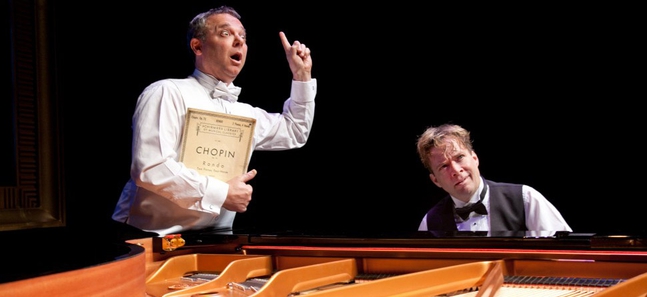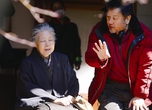2 Pianos 4 Hands
Ivory-tinkling actors Richard Greenblatt and Ted Dykstra return to Tokyo

Richard Greenblatt and Ted Dykstra in ‘2 Pianos 4 Hands’
Posted: Tue May 08 2012
When they appeared together in children's play So You Think You're Mozart in 1993, Canadian thesps Richard Greenblatt and Ted Dykstra discovered that they had a surprising amount in common. Growing up in Quebec and Alberta, respectively, both men had once nurtured dreams of making it as concert pianists, only to abandon these adolescent ambitions when they reached the age of 17. Encouraged by a theatre director friend, the actors riffed on these experiences in a series of workshop sessions, until they had the basis for what would become 2 Pianos 4 Hands, a musical comedy with a generous dash of autobiographical detail. Seated at a pair of grand pianos, the two leads dredge up memories of stern teachers, overbearing parents, stage fright and failed attempts to master Franz Liszt's 'Mephisto Waltzes' – complete with ample musical accompaniment. This bimanual two-hander play would end up becoming one of the biggest Canadian hits of all time, in the process taking its creators to New York, London and Tokyo, where they performed for three weeks in 2004. Although Greenblatt and Dykstra had pledged to leave 2 Pianos 4 Hands to other, younger actors after they reached their 700th performance, they were lured back to it last year, and are now returning to Japan for a second run in Tokyo this month, which will be followed by dates in Sendai, Nagoya and Osaka.
You've performed 2 Pianos 4 Hands over 800 times now. Does it stop feeling like you're actually playing yourselves after a while?
Richard Greenblatt: ‘I think that is true, yeah. You kind of lose that original impetus of, "Oh, that actually came from that specific moment in my life." There are some scenes that are like that – like, "I remember the time my mum said that," or whatever it is – and after a while it sort of becomes like a character version of yourself.’
Ted Dykstra: ‘We never really meant it to be an autobiographical piece. We thought about piano and teachers, and then we'd say, "Okay, so, you be a teacher, I'll be me as a kid, and you're teaching me about time signatures." And then, "You be you as a kid, I'll be a teacher, and I'll be teaching you about key signatures." So that's how we would start, and then we would improvise the scene.’
Richard: ‘There are some things, though…’
Ted: ‘There are some things that are from our parents.’
The general arc of the story, too – that refers to what actually happened to you, right?
Ted: ‘Sort of. Like, in the play itself, we both audition at age 17 – me for a Juilliard kind of school, and him for a Berkeley, jazz kind of school. Neither of us ever did that in real life, but we put it in the show because we wanted to bring the arc to an end. In real life, we both became successful theatre artists and never thought twice about leaving music, really.’
Richard: ‘But that's not what the play is about. That part of the play is what we call "hitting the wall". When you hit the wall as a teenager, usually you go, "Okay, so these are my limitations in this field – what do I do with that? Do I become a teacher? Do I see my life in that art form, because I love it so much, or do I throw it aside and do something else?" So that's where people totally relate, where they go, "For me it wasn't that, it was this, but the same thing happened to me." ’
What's the strangest comparison you've heard like that?
Ted: ‘Law school. A lawyer, saying it was just like law school. He was talking about getting in to some big law firm, and he didn't make it, and now he was with a lesser firm but he always wondered what would've happened if he'd made it to that big firm in Dallas. A lot of people come up to you and they actually hold on to you and go, "I have to tell you this story." ’
Richard: ‘I remember having a great conversation with a couple. She was a very successful clothing designer, and her husband was a musician. She said, "Oh, what a downer. The play's a bit of a downer." And he says, "No, it's not a downer – it's totally not." It kind of reminded us that people bring who they are to the show – to any show, really, but especially this, because it's about meeting limitations. That's one of the reasons I think the show's successful: because people do plug into it very personally.’
Ted: ‘We did have some Americans suggest, "Maybe you guys should make it?" [Richard laughs.] "That'd be a good ending!" We were like, "I don't think you get this." ’
As parents, do you ever find yourselves doing the things that you're making fun of in the play?
Ted: ‘Oh, fuck yeah…’
Richard: ‘Even worse! There's one scene where I'm playing a child and Ted's my dad, and he's a real hard-ass. That's based on a scene that happened with me and my mother, but then at the end the child kind of makes a deal with the dad: "I'll keep on taking lessons as long as you never practise with me for the rest of my life – or the rest of your life." And my daughter did that with me. It's awful how it repeats. Ted used to give me a really hard time, because he would hear me be as bad as I was in the show, and he would say, "Hasn't the show taught you anything?" And then, lo and behold, his kids are now ten and eight, and he goes, "I'm just as bad, if not worse." ’
Ted: ‘My son will be in tears twice a week. That's just how it is.’
Richard: ‘There's something about classical music specifically, too: the rigour that it takes, the discipline – which we didn't have as children, but somehow we expect our children to have, because now we have it, as adults.’
Ted: ‘You want to say to your kid, "If you work hard now, you'll be way ahead!" They're like, "Fuck off!" You can't give them the lessons you now know at your own age, because they're that age. My kids still love it, though.’
Did you have any one piece that you could never quite master?
Ted: ‘It would be the Chopin Ballades, or the Mephisto Waltzes.’
Richard: ‘We actually hit a section like that in the play, where…’
Ted: ‘…we're practising something that we're never going to get…’
Richard: ‘…that we can't quite master, and we're sitting there trying to get it, trying to get it – so we end up playing rock and pop music.’
Ted: ‘It morphs into [Elton John's] "Bennie and the Jets".’
Richard: ‘So he's doing the "Mephisto Waltz" and it goes into "Bennie and the Jets", and I do the Chopin Ballades and it goes into [John Lennon's] "Imagine".’
Performing 2 Pianos 4 Hands in different countries, have you ever found that some bits really didn't work – some jokes fell flat, for instance?
Ted: ‘Not really. There's a few things we do – I'm not sure if you know who Paul Shaffer is? He's the keyboard player on the Letterman Show, and that's a real North American reference. It got a little bit of mileage in England, but not very much, and we cut the joke in Japan last time.’
Richard: ‘The joke is – and it really only works in Canada, almost – I'm listing off a whole bunch of composers: five Germans, five Russians, and it gets to Canadian composers and I can't name one. And finally I come up with "Schafer", because there is a Canadian composer called R. Murray Schafer. So for those who know, they go "Okay", but then he says "First name?" and I go "Paul". It's a very Canadian joke.’
Ted: ‘And Paul Shaffer is Canadian as well. No one gets that outside of Canada.’
So how did you find the audiences the last time you performed in Japan?
Ted: ‘They were great. They're very quiet, but their response at the end – the ovations are longer by double, almost, than anywhere else. They kept bringing us back, and one time we played the encore twice, didn't we?’
Richard: ‘We had to have a second encore.’
Ted: ‘Yeah, but the first time it happened to us, we said, "Well, we can play that encore again…" They're like [claps vigorously]. They clap really intensely, it's like a wall of sound, but they don't stand up – they're not North American, that way.’
Richard: ‘The laughter is Japanese laughter, it's not a raucous belly laugh…’
Ted: ‘Plus it's one step removed because of [the surtitles], so we don't know how much that contributes.’
Does performing with surtitles ever throw your timing?
Ted: ‘Yeah. Sometimes the laugh comes before you say the joke, and then sometimes the laugh comes just as you've moved on to the next bit: the laugh is lagging. But the guy who did the timing last time, he got quite fast. They got really good at it, and we noticed it – we noticed the timing was working out really well. So the translation must have been pretty good, too.’
Richard: ‘But the audience reaction was fantastic. The reviews were amazing, and the people coming back were saying exactly the same things that they say everywhere: how important it was, how much they related to it. I remember a woman last time we were in Tokyo who came up and said she had played for 15 years as a child and a teenager then had given it up – it had been a traumatic experience – and she hadn't touched the piano. And because she could see the show and laugh, and really go through it again, she was going to take it up again. She was going to start playing it again.’
2 Pianos 4 Hands plays at Nissay Theatre, May 12-20
Tweets
- About Us |
- Work for Time Out |
- Send us info |
- Advertising |
- Mobile edition |
- Terms & Conditions |
- Privacy policy |
- Contact Us
Copyright © 2014 Time Out Tokyo














Add your comment